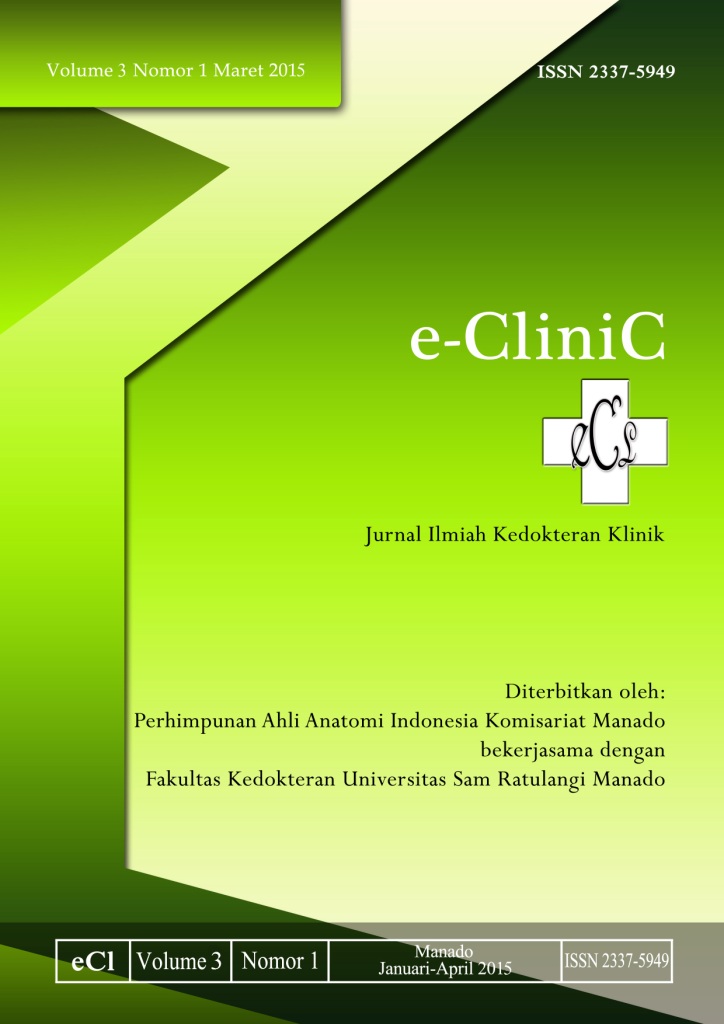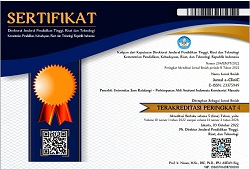GAMBARAN KUALITAS HIDUP PASIEN CEDERA KEPALA PASCA OPERASI PERIODE JANUARI 2012 - DESEMBER 2013 DI RSUP PROF. DR. R. D. KANDOU MANADO
DOI:
https://doi.org/10.35790/ecl.v3i1.7608Abstract
Abstract: Traumatic brain injury is a major global problem. Global incident average in urban areas ranged from 108 to 332 new cases admitted to the hospital per 100,000 population per year. About 39% of patients with severe brain trauma died due to injuries, and 60% had low Glasgow Outcome Scale (GCS). Neurosurgical surgery decreased the incidence of death and injury due to head trauma from 72 to 25%. However, patients still show significant disability after completion of therapy. Disability could manifest in the form of physical, mental, and/or behavior disability. This was a descriptive study with a cross-sectional design by using a questionnaire. This study aimed to obtain the quality of life of patients with head injury in post-operative period from January 2012 - December 31, 2013 in Prof. R. D. Kandou Hopital Manado. The results showed that most respondents were male (61.3%), aged 11-20 years (48.6%). Most respondents lived at Malalayang (19.4%). The most frequent head injuries were mild head injuries (74.2%). The final states of the patients (GOS) were: good recovery 58.1% and moderate disability 41.9%. Patients with GCS mild, moderate, or good recovery disability were 3.2% each. Patients with GCS were mostly good recovery (48.4%). Most patients with severe GCS experienced moderate disability (12.9%). Characteristics of patient satisfaction were satisfied 54.8% and not satisfied 45.2%. Relationship of satisfaction level with GOS was as follows: most satisfied patients had good recovery (35.5%), where as most not-satisfied patients had moderate disability (29.0%).
Keywords: head injury, post craniotomy, patient satisfaction
Abstrak: Kerusakan otak traumatik merupakan masalah global utama. Insiden rata-rata di perkotaan secara global berkisar dari 108 sampai 332 kasus baru yang masuk rumah sakit per 100.000 populasi per tahun. Rata-rata 39% pasien-pasien dengan trauma otak berat meninggal karena cedera, dan 60% memiliki Glasgow Outcome Scale (GCS) yang rendah. Tindakan operasi bedah saraf menurunkan insiden kematian dan cedera akibat trauma kepala dari 72 sampai 25%. Meski demikian, pasien-pasien tetap menunjukkan kecacatan yang nyata sesudah menyelesaikan terapi, baik berupa cacat fisik, mental, dan/atau perilaku. Penelitian ini bertujuan untuk melihat gambaran kualitas hidup pasien cedera kepala pasca operasi periode Januari 2012-Desember 2013 di RSUP. Prof. Dr. R. D. Kandou Manado. Hasil penelitian menunjukkan responden terbanyak ialah laki-laki (61,3%), usia terbanyak 11-20 tahun (48,6%), alamat responden terbanyak di Malalayang (19,4%). Cedera kepala terbanyak ialah cedera kepala sedang sebesar 74,2%. Keadaan akhir pasien (GOS), good recovery sebesar 58,1%, sedangkan moderate disability 41,9%. Pasien dengan GCS ringan, moderate dissability dan good recovery masing-masing sebesar 3,2%. Pasien dengan GCS sedang paling banyak good recovery yaitu 48,4%. Pasien dengan GCS berat paling banyak mengalami moderate dissability yaitu 12,9%. Karakteristik kepuasan pasien diperoleh puas sebesar 54,8% sedangkan yang tidak puas 45,2%. Hubungan tingkat kepuasan dengan GOS, yang puas ter banyak pasien yang good recovery yaitu 35,5%, sedangkan yang tidak puas terbanyak moderate dissability yaitu 29,0%.
Kata kunci: cedera kepala, pasca kraniotomi, kepuasan pasien.
Downloads
How to Cite
Issue
Section
License
COPYRIGHT
Authors who publish with this journal agree to the following terms:
Authors hold their copyright and grant this journal the privilege of first publication, with the work simultaneously licensed under a Creative Commons Attribution License that permits others to impart the work with an acknowledgment of the work's origin and initial publication by this journal.
Authors can enter into separate or additional contractual arrangements for the non-exclusive distribution of the journal's published version of the work (for example, post it to an institutional repository or publish it in a book), with an acknowledgment of its underlying publication in this journal.
Authors are permitted and encouraged to post their work online (for example, in institutional repositories or on their website) as it can lead to productive exchanges, as well as earlier and greater citation of the published work (See The Effect of Open Access).







